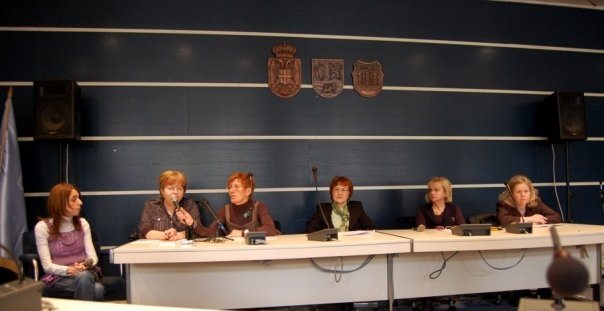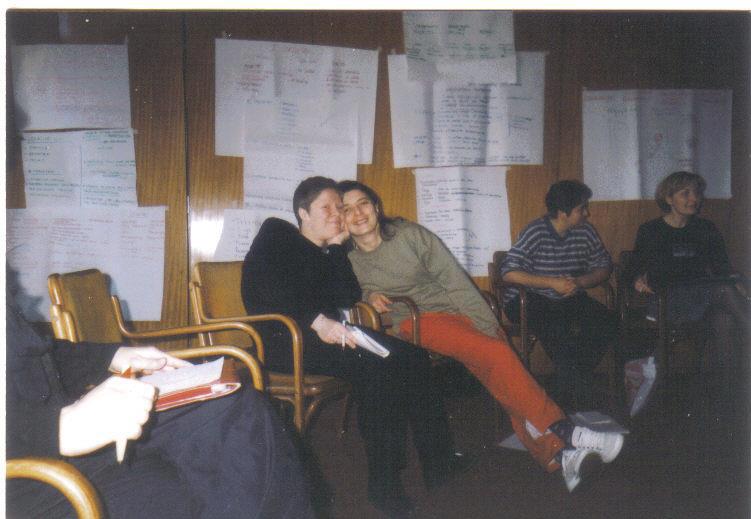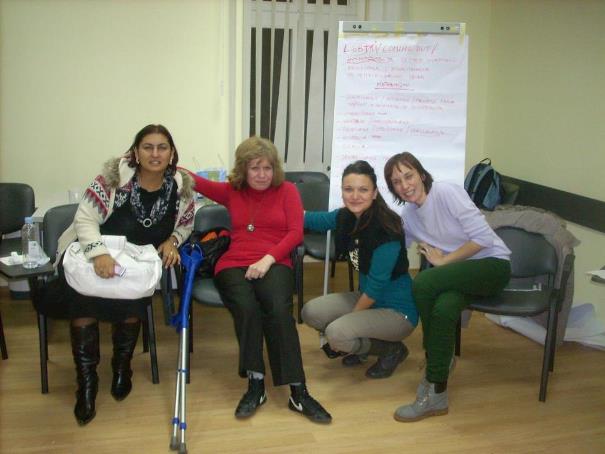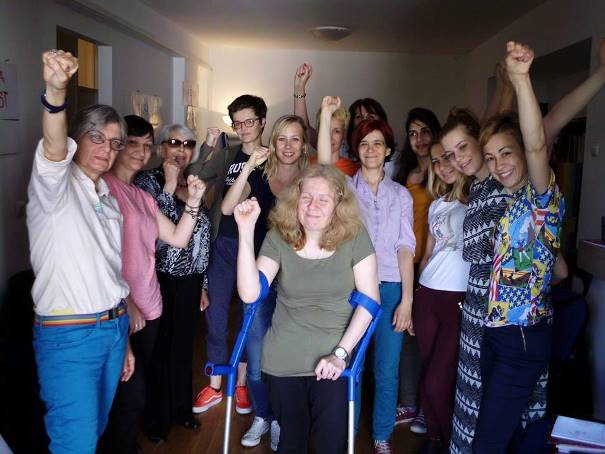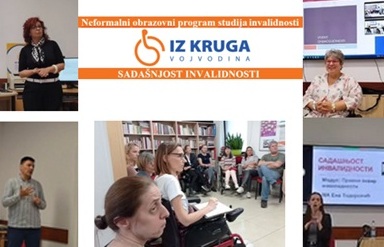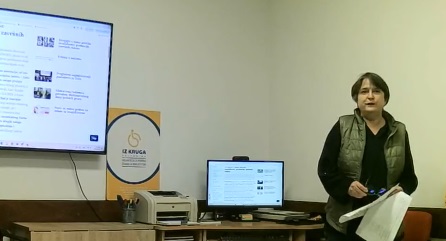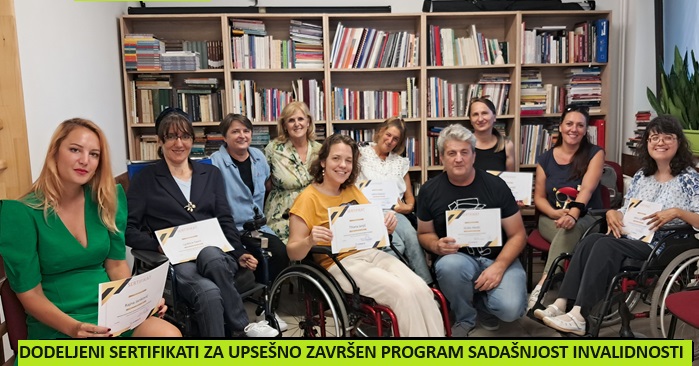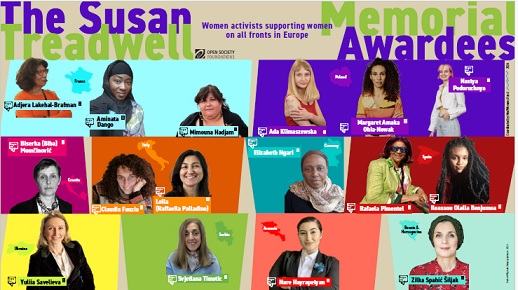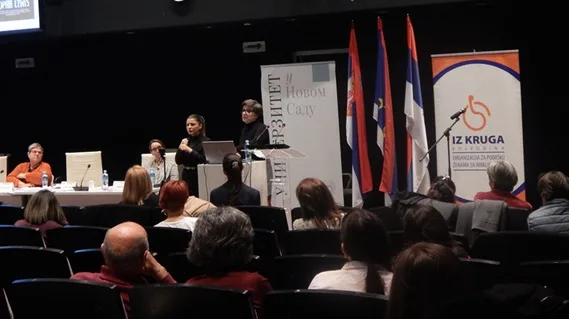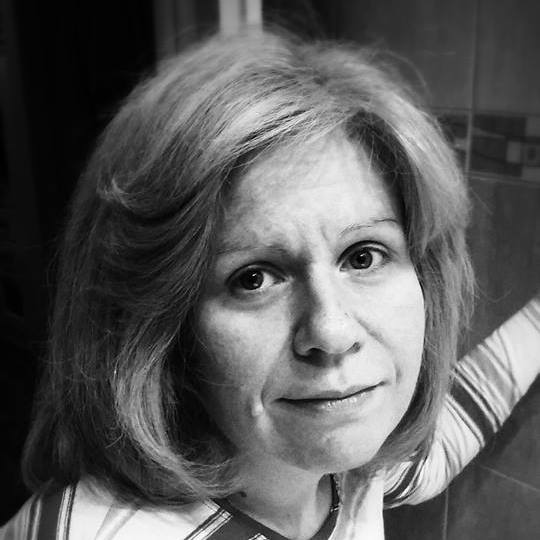 Occupation/ employment/ hobby: I don’t have an official job title, but unofficially I am an expert in working with women with or without disabilities that suffered violence. My hobby is reading and writing. So far I have published articles in newsletters of the organization…IZ KRUGA-Belgrade and I have published a case study on Women with Disabilities: The Invisible Victims of Violence.
Occupation/ employment/ hobby: I don’t have an official job title, but unofficially I am an expert in working with women with or without disabilities that suffered violence. My hobby is reading and writing. So far I have published articles in newsletters of the organization…IZ KRUGA-Belgrade and I have published a case study on Women with Disabilities: The Invisible Victims of Violence.
Olivera in two words: optimistic an open
She doesn’t like buzz and crowds and the verb ‘to hate’ she dislikes in all of its forms.
CHILDREN, UNION
Whenever somebody mentions childhood, what first comes to my mind is school, because I found it very important. I think of two different types of kids from two different types of schools I attended. I went to school for children with cerebral palsy (CP), where we would follow the regular curriculum until the fourth grade of primary school. After that, all kids would be sent to some kind of a special school. That wasn’t my case because my teacher managed to make it possible for me to pass some tests and to be transferred to Dr Dragan Hercog School. This was the school for children with disabilities, and for the children who were undergoing a treatment. That school still has its branches in hospitals such as the hospital in Banjica, the Institute of Mother and Child, University Children’s Hospital in Tiršova. After attending that school we could enrol any of the regular high schools. While I was at that school, I already realized the fact that discriminated kids could also be the ones who discriminate. This would become extremely important in my activist work. I saw how we discriminate each other – we who are already being discriminated on different aspects from majority of population. But that is something that isn’t talked about. I was the only child in my class with CP, a diagnosis linked to mental damage because it comes from various brain injuries. Those injuries could be mechanic, which means they can, but do not necessarily do, cause mental deficiencies. My injury was in my balance system, and in the part in charge of my motor skills. The children around me didn’t have any problems with accepting that, but the medical staff did. I was forbidden to leave my classroom so I couldn’t mingle with children from other classes. When the lessons finished for the day, I would move to the building where children with CP would stay, to the part forbidden to the children above the age of 11. The nurses that knew me since my early childhood would hide me, because that was the only way for me to finish regular school.
I grew up in an institution for rehabilitation of children with cerebral palsy. Some children would stay a bit extra after school, and go home every day. Some kids were staying at the institute, and go home only for holidays, and occasionally at weekends. Some children never went home because their parents left them there. I used to stay a bit extra after lessons and go home every day, though there was a six-months’ period when I stayed at the institute because my mother couldn’t drive me to school. I realized how children, whose parents rarely or never came, were being treated at the institute. The main reason why other children avoided spending time with us was because we were treated differently. We wore over-sized pyjamas, many of us had our heads completely shaven, and when they would take us out they would put three of us in one wheel chair and just leave us like that. No matter how hard it was, it was an invaluable experience because we learned how to help each other. There were children who could do far less than me -some of them I fed and changed their clothes, made their beds. I learned that we couldn’t expect help from anyone else unless we help each other.
THE RIGHT TO EDUCATION ABOLISHED
I was always among top students and I used to love school. When I was about to enter high school, my mom took the necessary papers to the same school my older sister attended. My sister was born the same year I was because I was born three months prematurely, but I caught up with her. She was already in the first grade of high school and I was finishing the eighth grade of elementary school. We had similar grades at school and I knew I could finish the same school she would. But the school principal told my mother that I couldn’t enrol the school because that would mean that somebody would constantly have to be there for me. ‘That’s’ not a problem,’ my mom said. ‘Her older sister is there.’ ‘Yes, but they don’t go to school at the same time and her sister is also a child herself,’ he was very explicit. ‘She needs to have an adult by her side.’ We didn’t understand why. I was independent; I used crutches to move around. ‘The school cannot be held liable should anything happen to her.’ The same story went on in couple of other schools I wanted to enrol. We were advised to try Petar Leković School, which in those years was attended by children with disabilities, primarily with mild forms of mental deficiency, and children with behavioural disorders who were in correction facilities. Because of this, there was a lot of violence in the school. My mom was appalled the first time she went there. ‘This isn’t a school for you,’ she said knowing that I would probably immediately end up in a fight, because I would always speak out and, even back then, I wouldn’t restrain myself from hitting somebody. In those days there weren’t any boarding schools in Belgrade. There was one such school in Zagreb, Podgorica and Sarajevo. I wanted to go to Podgorica because my aunt lived in Montenegro, but my mom was afraid to let me go that far away at the age of only 14. She became a widow very early and she was a single mom. She took care of me, of my sister, of everything. I had experienced many painful moments until then, but that one was the worst -nothing had hurt me more than that. This country sent me a clear message: you don’t need school because you won’t be a useful or contributing member of the society. Today there is a law that forbids discrimination based on this ground, but there are still children who can’t go to school because it isn’t accessible. I learned from my sister’s books things I found interesting and I was reading a lot. I still do. It was hard, but I didn’t want to think about myself, or talk about myself in the same way other people thought of and talked about me. I don’t identify myself with that no matter how angry or sad I am.
THE FORMS OF PERSONAL REBELLION
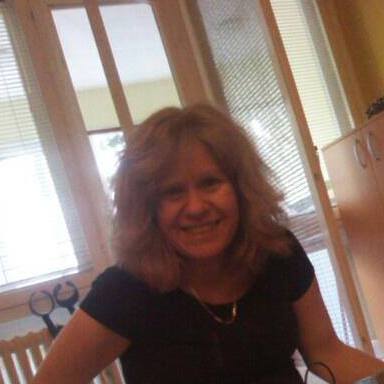
The first conflict with my mother I had when our visions of my life didn’t match. I chose something and someone she didn’t approve of. I asked her: ‘Why are you talking like that, when you always used to say that I’m worth just the same, and that I have the same rights and obligations like somebody who isn’t disabled? Why are you talking differently now?’ She said: ‘Take a look at yourself in the mirror. Then it would be clear to you.’ At that moment I realised how extremely strong that fear is in her. That was the first time we didn’t agree on where my life is going to lead me and how it should be, just because she didn’t approve of my choice of a partner. I said: ‘Ok, even if I make a mistake, it is all right, I am entitled to it. Don’t we all make mistakes in our lives?’ ‘Yes, but you would pay much more for your mistake,’ she said. That was the first time that she said that she knew what was best for me. I knew that wasn’t true, because I was 27 years old, and was an activist for the rights of women with disabilities. I made a decision to start living on my own one day. I did it much later than I initially thought, but the decision itself was made back then. I knew that my decision had nothing to do with anyone in particular – not with my then boyfriend (that wasn’t his concern because it could have been anyone else instead of him). What was important was that I thought I had the right to something I was deprived of. I was a mature woman who worked, earned her living, helped others and provided support. Somebody making decisions on behalf of me just didn’t fit into that picture. I just wanted my freedom while at the same I wanted to respect everything my mom had ever done for me. My mom got ill, so I postponed my leaving home. She was an extremely tough woman who did everything on her own, who raised me and now she needed my help. The only thing I wanted is to be there for her. I told myself: ‘Once she gets better, the two of us would sit down and discuss everything. We would continue to love each other but we just wouldn’t be living together anymore.’ But my mom never got better.
INDEPENDENCE
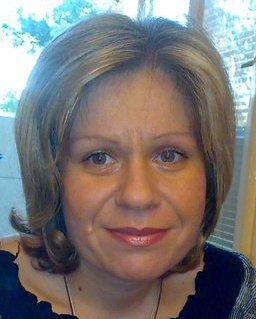
‘Have a look at yourself in the mirror. Then it would be clear to you.’ Even now I can still understand this sentence. Many women are going through the same situation when they rebel. And we quite often rebel against our mothers because usually fathers abandon us long time before the rebellion happens. Single moms are burdened with too many obligations, without any support: ‘Your child – your problem. You gave birth to her the way she is, so it is what it is.’ My mom had the support of her family, but not the support of my father’s family, who made a clear distinction between my sister and me. But the relationship between me and my sister was far beyond that – nothing could affect it. Between the age of six and fourteen I had eight or nine surgeries, one every year and a half. There were surgeries where doctors didn’t know if I would survive or not. My sister and I never compared each other and we have a remarkable relationship. Many children of our own age were told by their parents: ‘You should look after your disabled sister.’ My mom used to say that we have to look after each other. I knew to get into a fight when somebody would pick on my sister, and she would do the same for me. She sometimes finds it hard to accept that she can’t do anything to improve my condition. I don’t find it hard. No one can live my life and spare me from certain things bound to happen.
WEAKNESS OF STRONG WOMEN
I don’t remember my dad. He died when I was three years old. I remember my stepfather who also used to be violent to my mom. He hit her twice and the second time she hit him back. There was a law on domestic violence back then, but it wasn’t treated as a criminal act, but as the violation of public peace and order. I remember a policeman who asked: ‘Who called us?’ I said I did. ‘If I have to come back here for the third time I am going to arrest you,’ he told my stepfather. After that he wasn’t physically violent, only verbally. I was sixteen back then and I knew that what was happening in my family shouldn’t be so. The only thing I couldn’t understand was why my mom, who is such a strong, financially independent woman, who is neither married, nor has children with him, is putting up with it. It took me many years to realize the extent of patriarchal upbringing and how hard it was to free yourself from emotional addiction. Perhaps all of that caused my mom’s health problems. He convinced her that jealousy was love, and that he did it all because he loved her. It was easy to convince her because she loved him. Only when she realised that it was doing her a lot of harm, she decided to break up with him… But it had already lasted for too long. Her health was already too bad. She was one of those people who couldn’t ask for help because she was always told that she could do everything on her own. It is important to tell women that it isn’t a crime to make that one wrong choice in life. But that the violence they are enduring is a crime. There’s a big difference between the two. It seemed like my mother was punishing herself for her wrong choice. If there had been somebody to tell her that it wasn’t her fault, things might have been very different.
HOW I BECAME AN ACTIVIST
Eighteen years ago I went to the first workshop of the organization IZ KRUGA – BEOGRAD (Out the Cycle / Breaking the Cycle – Belgrade). It was by pure chance, though nothing in life happens by chance. An acquaintance came to the rehabilitation institute – the one bearing such a name though nobody has ever really worked with us – and asked: ‘Who wants to join me at the workshop?’ Being curious by nature and seeing the topic ‘Mother-Daughter Relationship and Violence in the Family’ was more than enough for me to go there. Back then, the organisation was using the premises of the Autonomous Women’s Centre, where I met Lepojka Čarević Mitanovski, Vesna Draženović, Stojanka Ivanović, Dragana Milinković and Lepa Mlađenović. All these women had a great impact on me. Something unusual happened at that very first workshop: There was loud banging on the door and, once Lepa and Lepojka opened it, a woman whose partner was molesting her right there, came in. While the two of them were arguing with him in front of the door, my initial reaction was to approach the woman and ask her if she was cold, if she wanted some water or if there was anything I could do for her. I was there with her until the police came and then I thought: ‘This is the place for me; this is where I want to be.’ In three years that followed I tried to complete a course in working on a helpline. The first time in 1998, I failed because you couldn’t pass the testing if you missed even a single class, which I did because of the snow. That’s when I met Ljilja Bogavac and Dušica Popadić from the Incest Trauma Centre who taught me so many things. I finally managed to finish the course five years later in 2003. I was working at the helpline for a total of 12 years. Ljilja Bogavac supported me a lot in writing case studies. The idea itself came from their case studies of violence towards children. Lepojka Čarević Mitanovski also supported the idea about the book. I heard many stories, and I haven’t forgotten any of them because they are important: it is important for people to see what’s happening behind closed doors. My mom understood my activism. She knew what I was doing and she knew my reasons. She didn’t want to discuss her situation with anyone, because it was considered to be shameful, especially for her since everybody thought of her as a strong woman. How could a strong woman allow such a thing? Well, she can. Even strong women can put up with violence. That helped me to understand women I used to work with on the helpline better, esp. when people said: ‘She went back to him.’ She did and she would keep going back again and again. I understood it because of my mom’s experience. But she was feeling so proud for teaching me not to tolerate it myself. I have a kind of a radar for violent people. I immediately leave the place if I notice even the slightest hint of turning violent from anybody.
MY CRUSHES, CHOICES AND RELATIONSHIPS
He was younger than me, so sweet and kind… He was a nice, obedient kid, far from a mischief. I got the feeling that this could be my first crush. I was seven or eight then and after that I didn’t think about it for a long time. Not even in general terms, not even in puberty. I never had flings because that’s not in my nature. I need to reach a certain level of emotional and intellectual intimacy, a connection. Being emotionally exposed is much more complex than being physically exposed. It was precisely because of it that the relationships I had were so important to me. They were multilayered, none of them was casual, and there were lots of reasons behind each relationship. Even when the relationships broke, the people I had a relationship with remained very important to me. A big love relationship of mine fell apart because, at that moment, I couldn’t choose to be independent. I wasn’t ready for certain situations, I needed time, but emotions and time aren’t always compatible. Sometimes emotions fade with time, whereas for certain things you can’t ask for time you need, because it’s not the way life works, life doesn’t stand still. My second big love ended up with his death. I don’t know how our relationship would have turned out were he still here today. I am alone now and it feels good. I would start a new relationship if something worthy of my attention pops up. But I wouldn’t do it if I couldn’t reach the level I once did, because I don’t make compromises with myself in this area. I can set some boundaries, but I give myself over totally, and always develop deep relationships.
I was in relationships only with disabled men and that was my deliberate decision. I am not saying I won’t ever change my mind about it. I believe that somebody might like me whether he is a disabled person or not. Everything gets more complicated when a man who isn’t disabled and a disabled woman need to go out in public, meet each other’s family and friends. Unfortunately, I haven’t met a man who is strong enough to defend his choices, not me, but his choice. We are raised in such a way that the woman should be the caring one, and the man the one who makes decisions. There is an assumption that a disabled woman can’t fulfil her nurturing role, nor be a mom. On top of everything, she isn’t sexually appealing, which makes her a poor lover. I don’t need to prove to anyone that I am equally good, nor do I need to justify myself to anyone. If somebody put me in a situation where I’d need to prove myself, I am afraid it wouldn’t be a nice experience for either of us. People say: ‘You should help someone who has a relationship with you to accept you being disabled.’ I say: ‘Why should I help him? If he has a problem with that he should seek help somewhere else, because I don’t see a problem there.’ My disability doesn’t represent a problem for me. I can overcome functional problems in everyday life and face obstacles, both physical and mental ones. Being disabled is just one of my aspects, it’s not all there is to me. It wasn’t my choice, the same way I didn’t choose the colour of my eyes or hair. What I did choose is to be a feminist, a sympathising friend, a supporting sister. I would always choose these things. I accepted myself the way I am; I don’t think I am better or worse than anyone else.
BEING DISCRIMINATED, YET THEY DISCRIMINATE, TOO
When I was at school, I used to share my desk with a disabled Roma girl and we were very close. When I first met a woman who said she was a lesbian I was shocked. It was at the conference Women with Disabilities and Violence in 2000. That was my first conference and there were 25 women from all of the ex-YU countries, each of them with one form of disability or another. We were at the workshop about coping with being different, when one of the women said she was a lesbian. I already got to know her by then and we had already bonded, we liked each other. I was sitting there in wonder thinking: ‘Now what?’ I looked at her and told to myself: ‘What difference does it make? She is still the same person, a girl I like a lot.’ My behaviour towards her didn’t change, but I could see the change in some of the participants. That made me really angry. At the workshop we had to write what we thought about a woman with disability, a Roma woman, a lesbian, a female football player, an Albanian woman… Women with disabilities had bad things to say about all those groups of women, except themselves. How come? Why? How do you expect that somebody doesn’t discriminate you, if you are doing it yourself? How can you expect to get something that you can’t give yourself? Why do you think you are better or that your problem is bigger? I won’t be stabbed in the street for the way I walk, but my friend who is a lesbian might be. Perhaps the fear of being different is more prominent in us because we don’t have the chance to find out, to learn. Hadn’t I gotten the opportunity to hear that woman who was brave enough to come out before us then and there, who trusted us enough to do so, I wouldn’t have found out how I would react, nor would I have worked on myself. Perhaps I would continue to think wrongly. We definitely have a completely wrong perception of some people because we don’t know them at all. What connects us is important to understand those things that separate us. I don’t have to be a Roma to understand a Roma woman. It is important that I try to understand a different woman and that doesn’t go without learning and working on yourself. It’s dangerous to think you know everything there is to know and that you are having the hardest time. I’m not saying that it’s easy for me, but it’s also not harder just because it’s better for someone else. We all have the right to live freely, without hatred and violence. Through feminism I discovered that there is a way to mutual understanding without hurting each other, a way to learn from each other, to develop and be who we really are. You can’t be happy without freedom, nor can you have a good life without happiness.
… IZ KRUGA – BELGRADE
Working on the helpline is something that I enjoy doing the most. It’s really fulfilling to know you have actually helped somebody. That it is not just another item in statistics, but there are real women who made important life decisions and fought for themselves with my support. Each and every one of them has been important to me. I know that I have contributed to something and that something is changing on a local level, one woman at a time. The first time I left the Organisation was when we were conditioned to have a male psychologist for women who experienced violence. I did understand we had to do it for the financial support. I couldn’t support it because then I would have to tell to a woman something that I personally didn’t believe in. I wouldn’t be able to tell a man if I had been sexually abused, raped, beaten, harassed… I wouldn’t be able to do it; it was already hard enough to tell it to another woman. My starting point was: ‘How could I expect something from another woman that would be hard for me as well?’ I believe that women who have experienced violence need women educated to work with them. I do believe there are men sensitive enough to the topic of violence towards women. In my opinion, they should then work with men who are violent. It is so personal to tell somebody what those women told me. It takes a huge amount of trust, the one that is gradually built, developed and kept. I stayed at the Organization until they found a substitute for me. When a female psychologist came to work at the Organization, there were no volunteers left so I came back. I left the Organization and was coming back several times, believing that my experience as a feminist disability activist, as well as a women’s rights activist in general, could still be a valuable contribution.
I always saw the Organization primarily as a female one. Regardless of some issues, for example, when they would organize a seminar in an inaccessible place, although the Organization …IZ KRUGA-BELGRADE had been talking about it for the last 20 years, I think that the women’s movement has done far more for disabled women then the Disabled People’s Movement has. The latter has only recently shown interest in the rights of disabled women and the interest in this issue has grown slightly, primarily in non-traditional organizations. Organization …IZ KRUGA-BELGRADE was the only one dealing with this issue and lately the Centre for Independent Living of PWD’s had been dealing with it a bit. It is important to remember that feminists did it first. When they would make a mistake it was because they were actually doing something. Feminists were the first to address the thing common to us – being women, women likely to experience violence precisely due to this fact. Perhaps a Roma woman suffers violence because she is a Roma, but first and foremost because she is a woman. Perhaps she suffers violence because she is a lesbian, but first and foremost because she is a woman. The same goes for women with disabilities. Women with disabilities who happen to be Roma and/or of different sexual orientation than heterosexual are automatically being discriminated at many more levels. The feminists were the first ones to open the door to a sphere where we were able to ask for our own place, where we were accepted and recognized.
When I was leaving the Organization, I thought that it wasn’t going in the direction where I could picture myself. And that, in itself, is ok; I believe anyone can be replaced. It is important and necessary that there are organizations dealing with the rights of women with disabilities who have experienced violence, and are being discriminated everywhere and in every form on daily basis. Organization …IZ KRUGA-BELGRADE, together with all women who were and still are active, has done a lot over the last 20 years. I am very grateful that I was a part of that story. What more can I contribute to it? Currently, I think I cannot contribute more than I already have, at least not in a way that is acceptable to me. I contributed as much as I could to raising awareness about multiple discrimination and violence against women with disabilities. People often ask me how it is possible that women without disabilities can work on the phone with women with disabilities that experienced violence. They can, because what is common for both groups is that they are women and as women they can end up in a situation of being violated. It is important that in a team working with women with disabilities who have experienced violence there are also women with and without disabilities because the experience of living a life with disability gives a better idea about the circumstances of women calling the helpline. The first thing to ponder upon is: ‘What do we have in common?’ That is my guiding line. I first address what is common for both of us and then I deal with what is different.
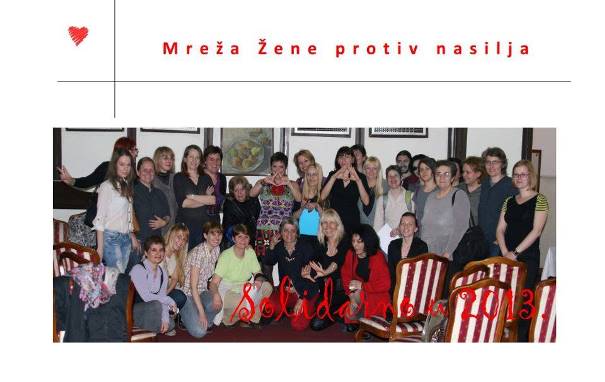 VIOLENCE AS A MEDIA TOPIC
VIOLENCE AS A MEDIA TOPIC

I noticed that people are talking ever more about violence against women, but not in the right way. On the contrary, quite often the topic is used to increase the popularity of a show, where a woman is asked to tell her story publicly, without a warning that by doing so she is facing additional violence… Without any responsibility and awareness what kind of damage it can cause. In this case it’s even better not to talk about violence at all. It is, of course, important to talk about it, but not if it makes a certain situation even worse. It should be known that a lot of women with disabilities suffer violence. Organization …IZ KRUGA-BELGRADE has never abused any of the women in a way mentioned above: this woman is going to talk about her experience, because that might help some other woman going through the same situation. NO! It is important to talk about it, but only when a woman is no longer being violated or no longer jeopardized in any other way. It should be a woman’s decision to tell her story and she should be aware of how and why she is doing it, and not do it because she owes it to someone else. Media quite often use women because it is a sensation. They don’t apply the Law on Personal Data Protection. If a woman is forced to retell her story in every single detail, she is being violated again. I can’t justify it, even if the person means well. Until a woman is completely out of a violent situation, she isn’t strong enough to go through it again without consequences. How will her experience help anyone then? When she leaves that part of her story behind, she is the one who decides whether, and with whom she will share her experience; that way she wouldn’t do it because she was conditioned. The women are being told: ‘I will give you a job, make sure your kid gets a place in a kindergarten, or anything else you need, but in return you will tell me your story.’ Why do women accept this? Because the media are abusing the power they have. Instead of calling upon those who failed to do what was their duty, and pressure them to tell why they failed, they force women to tell their story.
THE HARDEST PIECE OF FREEDOM
I still remember a woman whose disability ended up fatally in a very short time since she was diagnosed with ALS [1]. I was alone in the office when she came. She had gone through all forms of violence, starting from humiliation, being deprived of help, food, contacts, aids, and finally sexual violence and rape in her marriage. She was financially completely dependent on her husband, who was an important person in a city where they lived. She had ups and downs in terms of her physical strength. There were periods when she could walk, and then there were times she wasn’t able to leave her bed. She told me how her husband tried to kill her several times. When she decided to run away from him, she didn’t have an ID card with her, only her healthcare ID and some other medical documents. While she was trying to reach us, people were ridiculing her because she was stumbling and falling, so they thought she was drunk. She was homeless for a while and she was well aware that her time is running out. She told me: ‘I want to get a divorce.’ We hired a lawyer. She went to the court on her own, because there wasn’t a woman without a disability in the Organization who could accompany her. I was guiding her over the phone during the whole process. Her husband had told her that he wasn’t going to pay alimony to her. She got divorced immediately. Her health was deteriorating. She gave up on the alimony, because her ex-husband threatened to hurt her family. She called me to tell me about it and then she added: ‘I am sorry if I had disappointed you.’ I still remember that moment clearly. I replied: ‘You can’t possibly disappoint me. What you have done cannot be measured!’ The two of us had an agreement to be in touch every few days, so I could check how she was doing. At one point she stopped answering her phone and I could only assume what the reason was… I found it really hard, I kept thinking we could have done more for her, that it wasn’t good enough. And then Lepa Mlađenović told me something crucial: ‘If it was enough for her, it has to be enough for you, too.’ We all have a saviour hidden in us, someone who always wants to do a bit more. That woman actually lived long enough to free herself from her husband and I believe that her wish to be free was what was giving her the strength to fight. I remember her for her dignity that she had, even when everything else was taken away from her. She was on the verge of poverty, nobody believed her. ‘Do you believe that he did all those things?’ she would ask me. When you first hear what her husband did, you think: ‘This can’t be!’ There is no way that a human being could do something like that to another human being. Well, they can. Everything that she said, no matter how terrible it was, and it was definitely terrible, you believed it. That is the first necessary thing for a woman, so she could get her little piece of freedom. This woman did what she wanted, and she was extremely brave in doing so. I will never forget her. She knew her end was coming, and that it was inevitable, and despite all the pain she still managed to scrape up her courage and strength and face the violator by saying: ‘You are who you are, and not the person you present to the others!’ It’s priceless to fight for yourself. The moment you say: ‘I don’t accept this!’ the mountains will move if necessary. No matter how hard it is in your life, and even if you depend on other people, you are not helpless as long as you are alive.
TO BE CONTINUED…
I am planning to learn how to sew because I like doing things with my hands. We’ll see what life brings to me; perhaps I will even become a seamstress, the one that patches things up more than she sews. Perhaps one day I will write a book about how it is to be a woman with disability in Serbia. I still don’t have a draft, but I know it will have a lot of self-irony. If I could meet my twenty-year-old self after everything I’ve been through, I would tell her: ‘Life is a big miracle; there are a lot of things out there for you. It is great, sometimes difficult but great nonetheless. There is so much joy waiting for you, amazing things you didn’t even think were possible…’
[1] ALS – Amyotrophic lateral sclerosis
